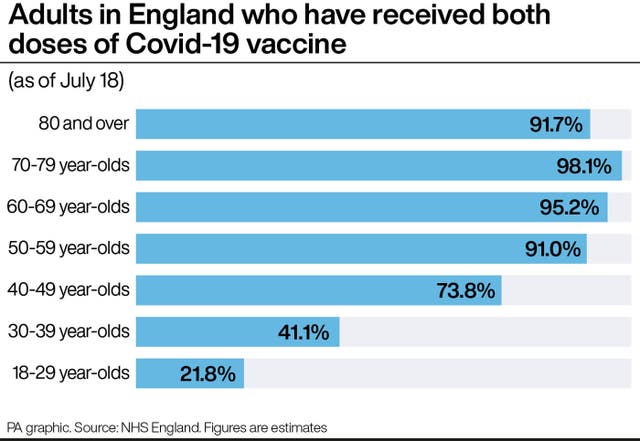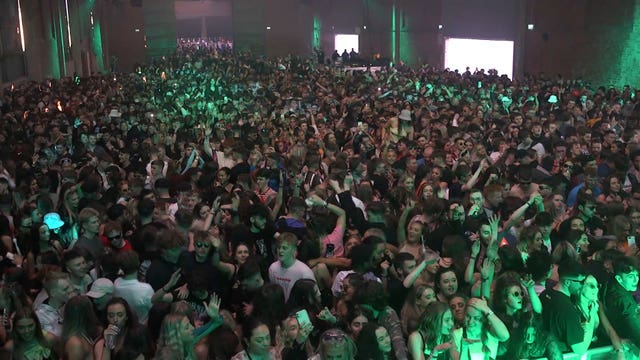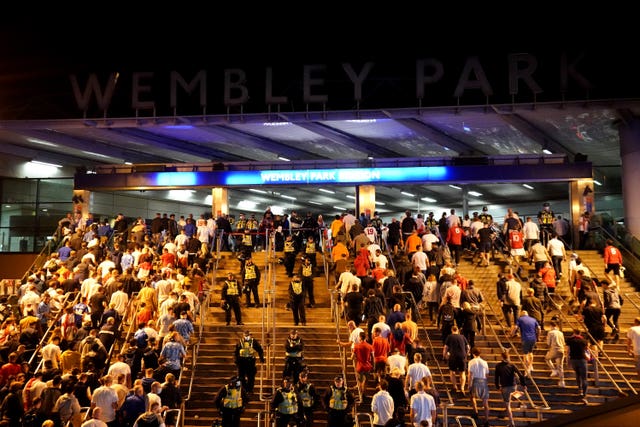While “freedom day” on July 19 meant nightclubs, theatres and sporting venues could finally reopen at full capacity, concerns grew over this sparking a potential rise in coronavirus cases.
Vaccine passports will become a condition of nightclub entry from September, and the Government is considering enforcing their use at other venues including stadiums where Premier League matches are due to be held from August.
Here, the PA news agency outlines everything there is to know about how vaccine passports work, their benefits and drawbacks, and where they might be required in future.
Vaccine passport is a term that has been given to a certificate which confirms a person has been vaccinated against coronavirus or they have recently taken a test which shows they are negative.
They have been rolled out in some countries, such as Austria, as a way of making sure people infected with coronavirus are not entering certain venues.
In England, the vaccination passport is called the NHS Covid Pass.
– Who can get one?
If you are aged 16 or over, you can get an NHS Covid Pass depending on your vaccination status or Covid-19 test results.
People are eligible if they had their second dose of the Pfizer, AstraZeneca or Moderna vaccine, or one dose of the Janssen vaccine, a minimum of two weeks ago.

– How can you get hold of one?
It is digital so it needs to be downloaded from the NHS app or NHS website. You can also download it as a PDF or get it sent to you in an email.
The digital versions last for 28 days if you are fully vaccinated and then automatically renew, while if you have a negative Covid test result it is valid for 48 hours. If you have tested positive within the previous six months, the pass lasts up to 180 days after the test.
People who are vaccinated can also have a paper copy sent to them which can be requested online on the NHS website. You do not need a GP referral for it.

From September, having a vaccine passport will be a condition of entry to nightclubs.
When clubs opened for the first time in 19 months on July 19, the Prime Minister announced that proof of a negative test would not be enough for entry, and revellers would need to be double-jabbed.
The Government has been offering the passes to people who have been taking part in its Events Research Programme from June 21.
The programme involves examining the risk of transmission of Covid-19 by people who have attended a series of trial events.
Events chosen included the FA Cup semi-final at Wembley, the Brit Awards, the World Snooker Championship, the Download music festival and Wimbledon.
In general, the positives of having a vaccine passport include giving people more opportunities to do things they may not be able to do otherwise, such as travelling.
People who have been fully vaccinated in the UK now no longer need to quarantine on arrival from amber list countries.
Separately, politicians have said they could help life resume as normal.
During an appearance before the Commons Public Administration and Constitutional Affairs Committee (PACAC) in May, Cabinet Office minister Michael Gove said the passports could help “economic and social life… return more quickly”.
– What are the negatives of vaccine passports?
Last month, MPs on the PACAC published a report which said Covid passports “disproportionately discriminate” against people based on race, religion, age and socio-economic background.
The report said the implementation would “by its very nature be discriminatory” and the MPs found “no justification for introducing a Covid-status certification system that would be sufficient to counter what is likely to be a significant infringement of individual rights”.
The passports have also already been subject to fraud, with some fake versions spotted online.
– Could they be made a legal requirement in other venues too?
Only fully vaccinated football fans may be able to attend Premier League matches and other events with more than 20,000 spectators from October under Government plans.

In unseated events such as music gigs, where there are greater concerns about strangers mingling and spreading Covid-19, the threshold for their introduction could be as low as 5,000 attendees.
– How much support is there for the idea of vaccine passports?
The announcement for nightclubs sparked a backlash from politicians and club owners.
Many backbench Tories are vehemently against vaccine passports, with senior Conservative Tom Tugendhat saying they risk creating “a social credit system of control”.
Labour has also opposed the idea, with shadow sports secretary Jo Stevens saying they would cause “major disruptions” to the start of the sporting season, and their use across other industries would “exclude those who can’t be vaccinated or haven’t had the jab because of delays”.
Peter Marks, chief executive of Rekom UK, which owns 42 nightclubs including chains Pryzm, Eden and Fiction, said the introduction of vaccine passports for clubs is a “terrible misjudgment” and described it as a “suicide note” for his business.






